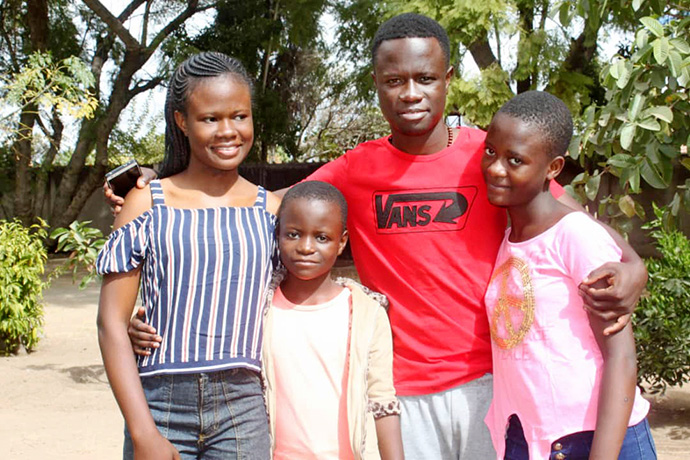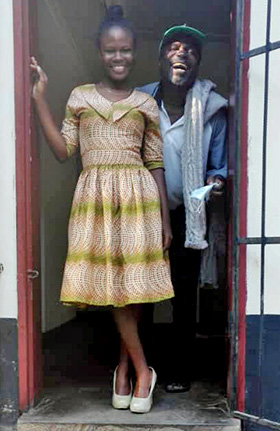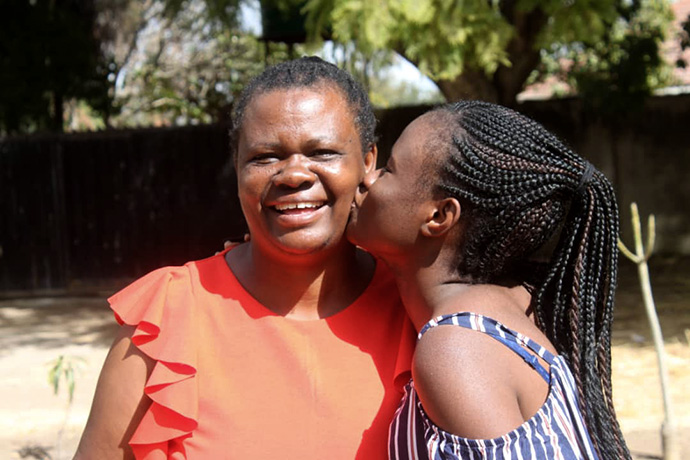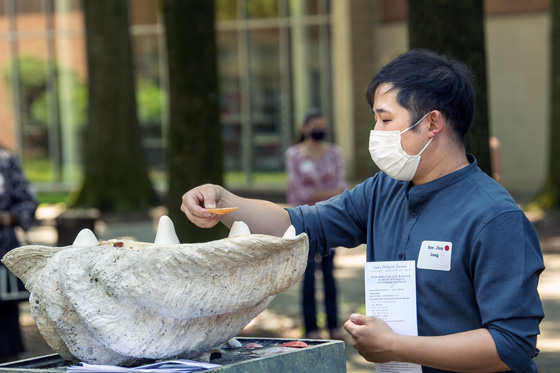
Key points:
• Mellan Nyagato is pursuing her studies online as she mourns the death of her father.
• Africa University staff members check up on her and her family regularly.
• Nyagato said her biggest worry is that her mother will be unable to pay for her education.
Africa University junior Mellan Nyagato, 21, would love to go back to the way things were less than two years ago.
Before COVID-19, the social work major lived in the AU dorm. Her family included her parents, two younger sisters and an older brother.
“My dad was the breadwinner,” Mellan recalled. “He was actually stronger and healthier than my mother. She is a nurse.” Then the pandemic struck, claiming Mellan’s father, Enock Nyagato, in July 2020.
Mellan and her siblings are not alone, as data from the Centers for Disease Control and other entities confirms. As of April 30, the pandemic had left more than 1.5 million children experiencing the death of a parent or a grandparent caregiver. More than 19 AU students and staff have lost loved ones to COVID-19.

Mellan Nyagato poses with her late father, Enock, who died of COVID-19 in July 2020. Photo courtesy of Mellan Nyagato.
“My mother is our major worry,” Mellan said, “since she is exposed to the pandemic.” Recovering from a stroke, Jestina Nyagato is susceptible to seizures and suffers from chronic blood pressure problems. Putting food on the table and paying tuition fees and bills is an ongoing struggle, but Mellan’s mother persists.
“My three siblings have been healing," Mellan said. "They are motivating each other to continue working hard to reduce the stress on our mother, and to make our father proud. To earn a little money, they sold mufushwa (sun-dried vegetables)."
“Though things are hard,” Mellan said, “my mother is trying to make sure that I continue at Africa University.”
Since August 2020, Mellan and her younger siblings, ages 10 and 12, have been restricted to online learning. “The expenses of Wi-Fi have been tough,” she said. “The amount that my mother is paying monthly is not sufficient for all of us. At times, I attend class for the first 30 minutes only.” Sometimes, Mellan and her siblings skip a day or two of lectures so they can stretch their Wi-Fi as far as possible.
“Electricity is also a major problem,” Mellan continued. “I once spent a week without attending lectures, and catching up was hard. I had to ask others for help. During exam period, I wrote one of the exams at my mother's workplace.”
Learning from home also means sacrificing discussion opportunities. Finding a time that works for all participants is next to impossible. “We end up giving each other the sources where the information will be,” Mellan said.
She is grateful for Africa University staff members who check up on her and her family.
“The Rev. Maudy Muchanyereyi, AU chaplain, has been a mother, counselor and prayer partner to me,” Mellan said. After Mellan’s father died, Muchanyereyi called every day. “She always told me — and still is telling me — to hold onto the cross and remain prayerful. She has been standing with me; she always gives me hope.”

Another staff member who keeps in contact with Mellan is the dean of students, George Miti. He was one of her father's classmates. “I am the first girl in my family and, automatically, my mother's shoulder to lean on,” Mellan said. “I faced so much trauma and had to act as if all were well. Even now, I do not share my emotions in front of my mother or my younger sisters because it will affect them. Mr. Miti is the one I usually talk to and share pains and emotions.”
She also communicated with Phillip Bohwasi, a lecturer for one of her courses.
“I was traumatized with everything that had happened. ... I shared with him my experience, especially the fact that my father died in my hands with the whole family watching.”
Read more

Colleges, seminaries grapple with shot, mask mandates
They had tried in vain to get him admitted to a hospital, but he passed away at home.
Mellan told Bohwasi that although she was attending online lectures, she understood very little.
"He advocated for me at the school so that I could get counseling.” Her assigned counselor, Dr. Mazvita Machinga, assured her “that some of my feelings and thoughts were very normal. I had to heal slowly, and I felt better with time.”
Mellan is hopeful but concerned about her future.
She admitted that her biggest worry is that her mother will be unable to pay for her education.
Describing herself as a "bright student who is always attaining good results," Mellan said, "My fees have been getting paid late. … Family friends and relatives are helping so that I can be allowed to register for exams and courses.”
Mellan’s dream is to receive enough financial assistance to finish her degree, find employment and ease the financial strain on her mother.
“It has always been my wish to have a master’s as well in social work,” Mellan said, “but since my father’s death, I do not see that happening due to finances.”
“As a university,” said Dr. Peter Mageto, acting vice-chancellor, “we appeal to our partners and sponsors to continue supporting our current and future students. Without this support, most of our students would not be able to access higher education.
“We remain indebted to The United Methodist Church and its partners for standing with us during these difficult times, ” Mageto said.
Dunlap-Berg is a freelance writer in Carbondale, Illinois.
News media contact: Julie Dwyer at newsdesk@umnews.org. To read more United Methodist news, subscribe to the free Daily and Friday Digest.
Like what you're reading? Support the ministry of UM News! Your support ensures the latest denominational news, dynamic stories and informative articles will continue to connect our global community. Make a tax-deductible donation at ResourceUMC.org/GiveUMCom.



